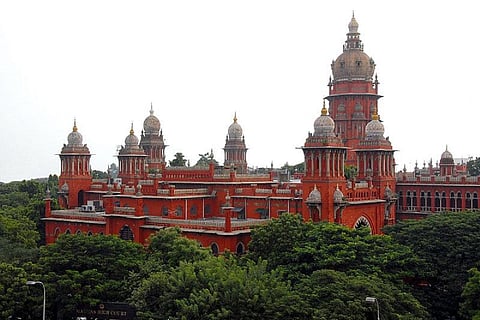

The Madras High Court, on Friday, January 7, refused to quash the first information report (FIR) against a Catholic priest for his speech against the Hindus. The offensive remarks made by the petitioner, priest P George Ponnaiah, against “Bharat Mata” and “Bhumi Devi” are tantamount to hurting the religious sentiments under Section 295A of the Indian Penal Code, the court said. Refusing the quash the FIR against the priest, Justice GR Swaminathan observed that the petitioner had poked fun at “those who walk barefoot out of reverence for Mother Earth.” He added that the Earth was worshipped as ‘Bhooma Devi’ and that there was no need to mount an attack on the religious beliefs of Hindus.
George Ponnaiah is accused of making derogatory comments against Hindus during a memorial meeting for late Jesuit priest and human rights activist Stan Swamy, in Tamil Nadu’s Kanyakumari district. The video of the speech had gone viral. The Arumanai police booked the Catholic priest in July 2021 under six sections of the Indian Penal Code, including section 295A (hurting religious sentiments) and Section 3 (disobeying regulation) of the Epidemic Diseases Act, 1897. The Catholic priest had filed a petition seeking to quash the FIR.
According to the judgment order, the Catholic priest had remarked that BJP MLA from Tamil Nadu, MR Gandhi, walks barefoot, but not Christians. “We wear shoes. Why? Because the filth of Bharat Mata should not contaminate us. The Tamil Nadu government has given us free footwear. This bhumadevi is dangerous, you could catch scabies from it,” the priest allegedly said.
Stating that the priest painted ‘Bhuma Devi’ and ‘Bharat Mata’ as sources of infection and filth, the justice said, “Nothing can be more outrageous to the feelings of the believing Hindus. It is not necessary that all Hindus should feel outraged. If the offending words outrage the religious feelings or beliefs of even a section of Hindus, the penal provision would be attracted.”
While advocate T Lajapathi Roy, appearing on behalf of George Ponnaiah, said that ‘Bharat Mata’ and ‘Bhuma Devi’ are not legal entities, the justice observed that ‘Bharat Mata’ evokes a deeply emotional veneration among a large number of Hindus and that ‘Bhuma Devi’ is considered a goddess by all believing Hindus.
“I use the expression “believing” because, even materialists, rationalists and non-believers also can be counted as Hindus. I may add tongue-in-cheek that even the great iconoclast and rationalist Periyar did not cease to be a Hindu,” Justice GR Swaminathan said, adding that, to many Hindus, a goddess has her own right.
He also said that prima facie, the petitioner has committed the offence under Section 295A of IPC, which is “deliberate and malicious acts, intended to outrage religious feelings of any class by insulting its religion or religious beliefs.”
The justice observed that since the priest convened the meeting to mourn Stan Swamy’s demise and to demand the opening of the places of worship amid the pandemic, there was absolutely no need or necessity to mount a visceral attack on the religious beliefs of the Hindus. “It was unwarranted and utterly unrelated to the occasion. That is what makes it deliberate and malicious,” he said.
“While a civic nationalist believes in India as a secular conception with the Constitution as its guiding light, to a religious nationalist, India is Bharat Mata. Even to the latter, the Constitution has to be the foundational and guiding document. The difference between “Jai Hind” and “Bharat Mata Ki Jai” will be the difference between the two categories,” he noted.
In his petition, the priest had referred to the writings of Dr BR Ambedkar, who had condemned Hindu religion and society in the strongest possible terms. To this, the court said that it was too much for the petitioner to be compared with revered leaders like Dr Ambedkar.
However, citing comedians’ and rationalists’ speech against religions, Justice Swaminathan said, “When stand-up comedians Munawar Faruqui or Alexander Babu perform on stage, they are exercising their fundamental right to poke fun at others. Again, their religious identity is irrelevant.”
Incidentally, Justice Swaminathan recently issued two judgments in the cases where CPI (ML) leader Mathivanan was booked for a Facebook post that said ‘Trip to Sirumalai for shooting practice’, and YouTuber Maridhas for a video he posted linking the Tablighi Jamaat meeting to the COVID-19 spread. In both cases, he upheld that individuals have the ‘right to be funny’ and ‘right to express.’
In this case of the Catholic priest, however, Justice Swaminathan observed that while a critical or even a harsh statement pertaining to religion or religious beliefs coming from a rationalist, a reformist, an academic or an artist would stand on a different footing altogether, those from an evangelist like the petitioner cannot claim a similar privilege.
The court quashed four out of seven charges against George Ponnaiah. Observing that the meeting was held in the priest’s private place to mourn the death of Stan Swamy, and to demand the opening of the places of worship, both of which cannot be an unlawful object, the Madras High Court quashed the offence under section 143 (unlawful assembly) of IPC. Citing that none of them suffered from any infectious disease or contributed to its spread, the court quashed section 269 of IPC and section 3 of the Epidemic Diseases Act, 1897. Charges of criminal intimidation under IPC section 506(1) was also quashed, citing that the speech was made from a platform and no affected person had complained that they felt criminally intimidated.
Partially allowing the priest’s original petition, Justice Swaminathan referred to English author Paul Johnson's book, “Jesus: A Biography from a Believer,” to state that he fell in love with Jesus Christ, and added, “I am certain that on the Judgment Day, God shall admonish the petitioner for having committed an un-Christian act.”